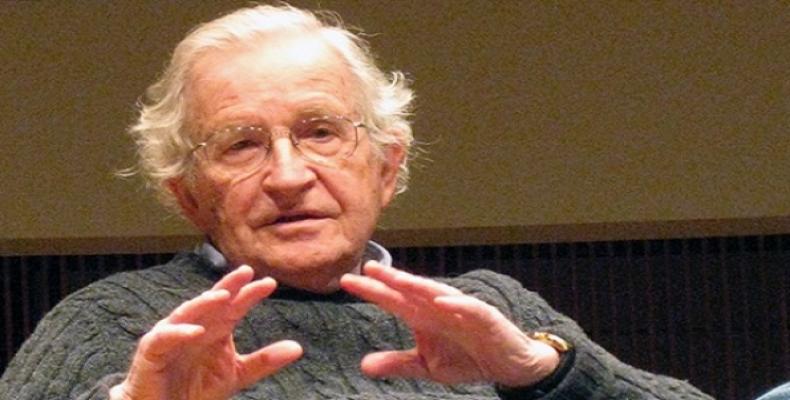The noted US intellectual and political activist Noam Chomsky has declared that humankind is now facing very serious dangers, with the capacity of either wiping out our species completely or substantially reducing its ability to survive.
These risks, the noted US intellectual said, would stem either from an eventual nuclear war, from the negative effects of climate change or from a pandemic disease that would impose disastrous consequences on our planet, each one leading to a moral dehumanizing crisis, which would spread an inability to react in face of human suffering or collective insecurity.
Let's examine the first of these three possibilities, that is, a nuclear holocaust. This possibility has emerged with force this very year as never before during the so-called Cold War.
The world harbors today several nuclear arsenals capable of destroying our planet several times over, and their presence shows that there exists the will to use them if necessary.
From the Second World War up to the disbanding of the socialist camp, the world lived under the threat of a “balance of terror,” based on the assumption that each of the main contenders were convinced that both, the United States and the Soviet Union, would be fully destroyed on the event of a nuclear conflict. This perception led to both opponents avoiding such conflict at all cost.
The geopolitical changes at the end of last century did not modify this perception, even though new actors emerged in the nuclear race, among them India, Pakistan, Israel and North Korea.
Two sceneries are now possible; one is a massive, world wide conflict and the other one is a limited one.
A massive nuclear conflagration, with the explosion of five to ten thousand megatons would most certainly lead to the extermination of the human species and of life in the whole planet.
The ashes, the smoke and other flotsam in the atmosphere would prevent the access of the Sun's rays to the Earth, stopping the vital photosynthesis process, drastically lowering the environmental temperature and provoking the death of vegetation and of all species that depend on it for survival, including animals and humankind.
Deadly nuclear radiation would add to the catastrophe, along with the disappearance of the ozone layer and the increasing destruction by the ultraviolet rays of the Sun.
Even if some humans would survive, they would lack foodstuffs or humanitarian and medical assistance.
Should a limited nuclear conflict break out, either with lower nuclear fuel or in a closed territorial extension, it would lead to climatic disturbances and changes affecting the whole planet and its inhabitants.
The specialists point that just fifty explosions such as that which destroyed Hiroshima would be needed to provoke an irreversible climate change.
It is not a matter of spreading fear, but collective responsibility in order to prevent that the madness of a few, blinded by their lust for supreme power, would take us all down into a nuclear hell without a single chance of surviving.


